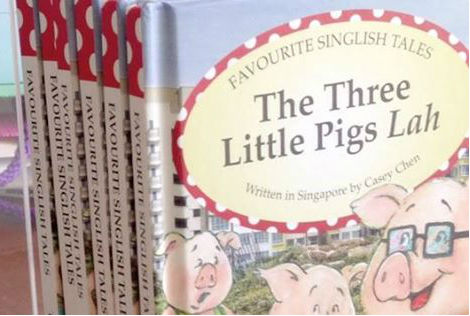Comprising a mixture of the English, Malay, Cantonese and Hokkien languages/dialects and having its own organisation of sounds, Singlish has today, come to be recognised as a part and parcel of Singaporean life. When you are overseas, you can easily tell a Singaporean from a non-Singaporean simply by their usage of Singlish in their conversations.

Singlish is here to stay – and even children’s books are written in Singlish nowadays. (Image from The Coffee Table Book – Facebook)
But is Singlish a good or a bad thing? The language has its supporters and detractors.
Positive Points
It is uniquely Singaporean
Singlish actually defines us as Singaporeans. Just like how the Japanese speak Japanese and how the French people speak the French language, Singlish has evolved to a point that it can be called uniquely Singaporean. It is our culture and identity.
For example, if you go overseas to study or to work, you know immediately who are the Singaporeans by the “language” spoken. Singlish is instantly recognisable all over the world and that is how we, as Singaporeans talk. So the “lahs” and “lors” are unique to us.
It “saves time” when speaking
Singaporeans are always in a hurry. So by speaking Singlish instead of proper English, precious seconds can be saved by using fewer words in speech, but still in a manner that other locals are able to understand.
For example, a person speaking proper English would say, “Do you really have the time to do this?”
But someone speaking Singlish would simply say, “Got time meh?”
Speaking Singlish helps to save time – in Singapore, where everyone is always rushing around.
It Binds Singaporeans Together
Singapore’s population comprises of Malays, Chinese, Indians and Eurasians, with English being used to bind individuals together. But not everyone has the inclination to speak the Queen’s English all the time. To many Singaporeans, they prefer to speak proper English only when they are at work or perhaps at other formal occasions. When people meet informally, Singlish is used in many situations – so this binds Singaporeans of all races together.
A Vibrant, Living Language
Singlish is spoken by a diversity of people in the community. And they really love and treasure it. Many take pride when they use and speak Singlish. It is our blood. So it is a vibrant, living language that will continue.
Negative Points
It tarnishes Singapore’s image
To some foreigners who come to Singapore’s shores, they may be less than impressed by locals who speak Singlish. As a result, their initial plans to invest in the Singapore market or to set up a branch of their multi-national company here, may be partly thwarted because of their less than positive image of Singapore’s English standards.
To the outside observer, it may be true that Singlish can sound low-class and off-putting, thus creating a poor reputation of Singapore and tarnishing our island nation’s good image as a nation of skilled, English-speaking workers. And this may affect Singapore’s growth in the long term.
May Thwart Children’s Learning of Proper English
If parents speak Singlish at home and the children speak Singlish to their friends, the kids may come to think that it is the proper way of speaking English. So this may affect their learning of formal English at school.
Difficult to Communicate with Foreigners
Outsiders may not be able to understand and speak to us, so communicating with foreigners may be a problem. This would not bode well for the future, in terms of say, tourism and trade.

nice!